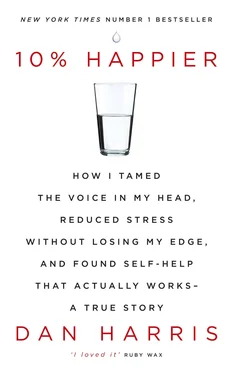“It’s like, you write a book, you want it to be well received, you want it to be at the top of the bestsellers list, but you have limited control over what happens. You can hire a publicist, you can do every interview, you can be prepared, but you have very little control over the marketplace. So you put it out there without attachment, so it has its own life. Everything is like that.”
For a minute, I thought he was being simplistic, giving a version of the perfunctory advice that parents give their children. “When I was a kid,” I said, “and I would get worked up about some soccer game or whatever, my parents would say, ‘Just do your best.’ That’s basically what you’re saying.”
“Yeah,” he said, in as snide a tone as he was capable of. “Me and your parents.” But it’s not the same thing, he explained. You can do your best and then, if things don’t go your way, still become unconstructively upset, in a way that hinders your ability to bounce back. Dropping the attachment is the real trick.
Then it clicked. Per usual, Mark’s advice was sound, even if it took me a while to absorb it. Striving is fine, as long as it’s tempered by the realization that, in an entropic universe, the final outcome is out of your control. If you don’t waste your energy on variables you cannot influence, you can focus much more effectively on those you can. When you are wisely ambitious, you do everything you can to succeed, but you are not attached to the outcome—so that if you fail, you will be maximally resilient, able to get up, dust yourself off, and get back in the fray. That, to use a loaded term, is enlightened self-interest.
It brought to mind a meeting we’d had at ABC a few months before the 2012 election. A small group of reporters, anchors, and executives were in a conference room, clustered around David Axelrod, who was conducting President Obama’s reelection campaign. At one point, Ben asked the preternaturally even-keeled Axelrod about the existential challenges of conducting a campaign in an environment where there were so many factors out of his control—from the European debt crisis to a potential al-Qaeda plot to Israel’s saber-rattling against Iran. Axelrod responded, “All we can do is everything we can do.”
This was a hopeful outlook, really. I didn’t need to waste so much time envisioning some vague horribleness awaiting me in my future. (Do they even have flophouses in Duluth?) All I had to do was tell myself: if it doesn’t work, I only need the grit to start again—just like when my mind wandered in meditation. After years of drawing a false dichotomy between striving and serenity, unable to figure out how to square these seemingly contradictory impulses, it struck me over eggs in a bustling brunch joint: this clunky phrase “nonattachment to results” was my long-sought Holy Grail, the middle path, the marriage of “the price of security” and “the wisdom of insecurity.”
It was the last piece of a puzzle I’d been trying to put together since the start of this whole unplanned adventure. All along, I’d been straining for some sort of framework, a holistic answer to one of the central challenges for a modern meditator: How can you be a happier, better person without becoming ineffective? The books and teachers I’d consulted had already done the most important work: reorienting my internal life by mitigating the noxious tendencies of my mind and juicing the compassion circuitry. It was just this one area where I thought they fell short.
Since the Buddhists are always making lists (I was convinced that somewhere they had a list of the Best Ways to Make a List), I resolved to draw up one of my own. Nothing on the list I compiled was, in and of itself, mind-bogglingly brilliant. There’s a reason why they call Buddhism “advanced common sense”; it’s all about methodically confronting obvious-but-often-overlooked truths (everything changes, nothing fully satisfies) until something in you shifts. Likewise, with my new list, executing these precepts in tandem—and then systematizing and amplifying the whole thing with regular mindfulness practice—elevated them from platitudes to powerful tools.
I played with titles for a while (“The Ten Pillars of Cutthroat Zen” was briefly a contender), but then I heard about the ancient samurai code, “The Way of the Warrior.” I decided to create a version for the corporate samurai.
The Way of the Worrier
1. Don’t Be a Jerk
2. (And/But . . .) When Necessary, Hide the Zen
3. Meditate
4. The Price of Security Is Insecurity—Until It’s Not Useful
5. Equanimity Is Not the Enemy of Creativity
6. Don’t Force It
7. Humility Prevents Humiliation
8. Go Easy with the Internal Cattle Prod
9. Nonattachment to Results
10. What Matters Most?
Don’t Be a Jerk
It is, of course, common for people to succeed while occasionally being nasty. I met a lot of characters like this during the course of my career, but they never really seemed very happy to me. It is sometimes assumed that success in a competitive business requires the opposite of compassion. In my experience, though, that only reduced my clarity and effectiveness, leading to rash decisions. The virtuous cycle that Joseph described (more metta, better decisions, more happiness, and so on) is real. To boot, compassion has the strategic benefit of winning you allies. And then there’s the small matter of the fact that it makes you a vastly more fulfilled person.
(And/But . . .) When Necessary, Hide the Zen
Be nice, but don’t be a palooka. Even though I’d achieved a degree of freedom from the ego, I still had to operate in a tough professional context. Sometimes you need to compete aggressively, plead your own case, or even have a sharp word with someone. It’s not easy, but it’s possible to do this calmly and without making the whole thing overly personal.
Meditate
Meditation is the superpower that makes all the other precepts possible. The practice has countless benefits—from better health to increased focus to a deeper sense of calm—but the biggie is the ability to respond instead of react to your impulses and urges. We live our life propelled by desire and aversion. In meditation, instead of succumbing to these deeply rooted habits of mind, you are simply watching what comes up in your head nonjudgmentally. For me, doing this drill over and over again had massive off-the-cushion benefits, allowing me—at least 10% of the time—to shut down the ego with a Reaganesque “There you go again.”
The Price of Security Is Insecurity—Until It’s Not Useful
Mindfulness proved a great mental thresher for separating wheat from chaff, for figuring out when my worrying was worthwhile and when it was pointless. Vigilance, diligence, the setting of audacious goals—these are all the good parts of “insecurity.” Hunger and perfectionism are powerful energies to harness. Even the much-maligned “comparing mind” can be useful. I compared myself to Joseph, Mark, and Sharon, and it made me happier. I compared myself to Bianca and it made me nicer. I compared myself to Bill Weir, David Muir, Chris Cuomo, David Wright, et al., and it upped my game. In my view, Buddhists underplay the utility of constructive anguish. In one of his dharma talks, I heard Joseph quote a monk who said something like, “There’s no point in being unhappy about things you can’t change, and no point being unhappy about things you can.” To me, this gave short shrift to the broad gray area where it pays to wring your hands at least a little bit.
Equanimity Is Not the Enemy of Creativity
Being happier did not, as many fear, make me a blissed-out zombie. This myth runs deep, all the way back to Aristotle, who said, “All men who have attained excellence in philosophy, in poetry, in art and in politics . . . had a melancholic habitus.” I found that rather than rendering me boringly problem-free, mindfulness made me, as an eminent spiritual teacher once said, “a connoisseur of my neuroses.” One of the most interesting discoveries of this whole journey was that I didn’t need my demons to fuel my drive—and that taming them was a more satisfying exercise than indulging them. Jon Kabat-Zinn has theorized that science may someday show that mindfulness actually makes people more creative, by clearing out the routinized rumination and unhelpful assumptions, making room for new and different thoughts. On retreat, for example, I would be flooded with ideas, filling notebooks with them, scribbling them down on the little sheets of paper between sitting and walking. So, who knows, maybe Van Gogh would have been an even better painter if he hadn’t been so miserable that he sliced off his ear?
Читать дальше












